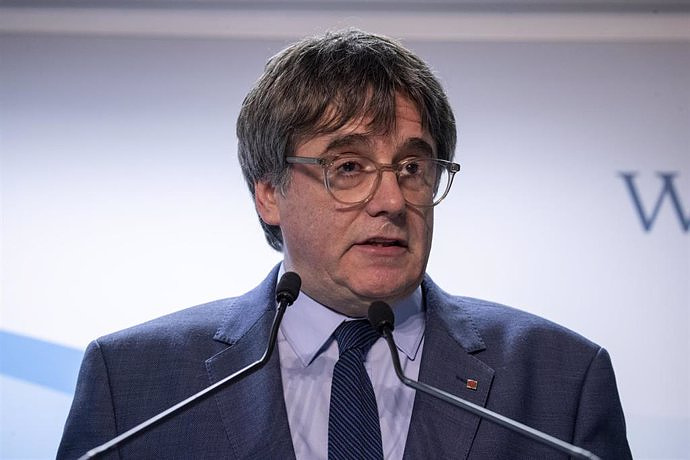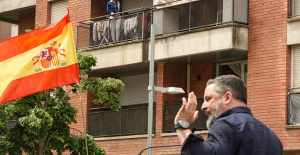BRUSSELS, April 25 (EUROPA PRESS) -
The European Parliament reiterated this Thursday its condemnation of the "intense contacts" of leaders of the Catalan independence movement with Russia, pointing specifically to former president Carles Puigdemont, and has requested an investigation into Russian interference in the context of the separatist referendum of October 2017. .
In a resolution approved with 429 votes in favor, 27 against and 48 abstentions on Russian interference in the European Parliament with an eye on the next European elections in June, MEPs have denounced Russian influence within the institution, pointing out that Moscow bought to MEPs "to spread Russian propaganda" and "create a network of dependencies through European political parties that act as amplifiers of Kremlin propaganda."
Among the specific episodes of Russian interference mentioned in the resolution is that of the MEP and former president of the Generalitat, whom it singles out for his contacts with the former Russian diplomat Nikolai Sadovnikov on the eve of the October 1 referendum.
Thus, the European Parliament condemns the "alleged intense contacts and meetings" between Russian agents and Catalan independence activists and requests a study from the European Center of Excellence for the Fight against Hybrid Threats in Helsinki.
It also calls on the competent judicial authorities to investigate the connections of MEPs allegedly linked to the Kremlin and attempts at Russian interference in the EU, in addition to "deploring all attacks against judges investigating any interference activity."
This resolution comes after the case of the Latvian MEP Tatjana Zdanoka, sanctioned by the European Parliament after journalistic investigations revealed that she has been working for Russian Intelligence for decades. Among other parties and leaders pointed out by the European Parliament resolution is Marine Le Pen, in France, whose economic relations with Moscow stand out, as well as the Austrian party FPÖ or the German far-right AfD, whose meetings with the party of Vladimir Putin.
Regarding the German formation, the text approved by the European Parliament points to information that Petr Bystron, a prominent member of the AfD, would have accepted payments of up to 25,000 euros to spread pro-Russian propaganda. It also points to recent allegations against a party parliamentary aide linked to a Chinese spy network.
Furthermore, the European Parliament indicates its concern about the "policy and positions of the Hungarian Government under the leadership of Viktor Orban", ensuring that it assumes "pro-Russian and pro-Chinese positions" on numerous occasions.

 Exploring Cardano: Inner Workings and Advantages of this Cryptocurrency
Exploring Cardano: Inner Workings and Advantages of this Cryptocurrency Seville.- Economy.- Innova.- STSA inaugurates its new painting and sealing hangar in San Pablo, for 18 million
Seville.- Economy.- Innova.- STSA inaugurates its new painting and sealing hangar in San Pablo, for 18 million Innova.- More than 300 volunteers join the Andalucía Compromiso Digital network in one month to facilitate access to ICT
Innova.- More than 300 volunteers join the Andalucía Compromiso Digital network in one month to facilitate access to ICT Innova.-AMP.- Ayesa acquires 51% of Sadiel, which will create new technological engineering products and expand markets
Innova.-AMP.- Ayesa acquires 51% of Sadiel, which will create new technological engineering products and expand markets Felipe VI swears the flag again 40 years later at the AGM with Princess Leonor as a witness
Felipe VI swears the flag again 40 years later at the AGM with Princess Leonor as a witness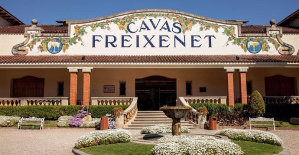 Freixenet and unions agree to reduce working hours by 20-50% this year due to the drought
Freixenet and unions agree to reduce working hours by 20-50% this year due to the drought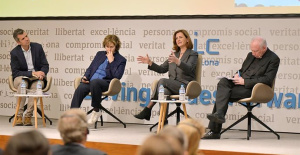 STATEMENT: Nearly 400 people participate in the II Family Support Conference at UIC Barcelona
STATEMENT: Nearly 400 people participate in the II Family Support Conference at UIC Barcelona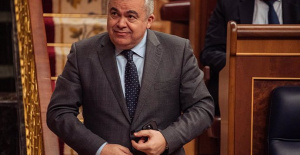 Cerdán censures the "dirty war" of the right and calls for a debate around "democratic regeneration"
Cerdán censures the "dirty war" of the right and calls for a debate around "democratic regeneration" How Blockchain in being used to shape the future
How Blockchain in being used to shape the future Not just BTC and ETH: Here Are Some More Interesting Coins Worth Focusing on
Not just BTC and ETH: Here Are Some More Interesting Coins Worth Focusing on A sensor system obtains the fingerprint of essential oils and detects if they have been adulterated
A sensor system obtains the fingerprint of essential oils and detects if they have been adulterated Faraday UPV presents the 'Origin' rocket to exceed 10 km of flight: "It is the beginning of the journey to space"
Faraday UPV presents the 'Origin' rocket to exceed 10 km of flight: "It is the beginning of the journey to space" The Generalitat calls for aid worth 4 million to promote innovation projects in municipalities
The Generalitat calls for aid worth 4 million to promote innovation projects in municipalities UPV students design an app that helps improve the ventilation of homes in the face of high temperatures
UPV students design an app that helps improve the ventilation of homes in the face of high temperatures A million people demonstrate in France against Macron's pension reform
A million people demonstrate in France against Macron's pension reform Russia launches several missiles against "critical infrastructure" in the city of Zaporizhia
Russia launches several missiles against "critical infrastructure" in the city of Zaporizhia A "procession" remembers the dead of the Calabria shipwreck as bodies continue to wash up on the shore
A "procession" remembers the dead of the Calabria shipwreck as bodies continue to wash up on the shore Prison sentences handed down for three prominent Hong Kong pro-democracy activists
Prison sentences handed down for three prominent Hong Kong pro-democracy activists ETH continues to leave trading platforms, Ethereum balance on exchanges lowest in 3 years
ETH continues to leave trading platforms, Ethereum balance on exchanges lowest in 3 years Investors invest $450 million in Consensys, Ethereum incubator now valued at $7 billion
Investors invest $450 million in Consensys, Ethereum incubator now valued at $7 billion Alchemy Integrates Ethereum L2 Product Starknet to Enhance Web3 Scalability at a Price 100x Lower Than L1 Fees
Alchemy Integrates Ethereum L2 Product Starknet to Enhance Web3 Scalability at a Price 100x Lower Than L1 Fees Mining Report: Bitcoin's Electricity Consumption Declines by 25% in Q1 2022
Mining Report: Bitcoin's Electricity Consumption Declines by 25% in Q1 2022 Oil-to-Bitcoin Mining Firm Crusoe Energy Systems Raised $505 Million
Oil-to-Bitcoin Mining Firm Crusoe Energy Systems Raised $505 Million Microbt reveals the latest Bitcoin mining rigs -- Machines produce up to 126 TH/s with custom 5nm chip design
Microbt reveals the latest Bitcoin mining rigs -- Machines produce up to 126 TH/s with custom 5nm chip design Bitcoin's Mining Difficulty Hits a Lifetime High, With More Than 90% of BTC Supply Issued
Bitcoin's Mining Difficulty Hits a Lifetime High, With More Than 90% of BTC Supply Issued The Biggest Movers are Near, EOS, and RUNE during Friday's Selloff
The Biggest Movers are Near, EOS, and RUNE during Friday's Selloff Global Markets Spooked by a Hawkish Fed and Covid, Stocks and Crypto Gain After Musk Buys Twitter
Global Markets Spooked by a Hawkish Fed and Covid, Stocks and Crypto Gain After Musk Buys Twitter Bitso to offset carbon emissions from the Trading Platform's ERC20, ETH, and BTC Transactions
Bitso to offset carbon emissions from the Trading Platform's ERC20, ETH, and BTC Transactions Draftkings Announces 2022 College Hoops NFT Selection for March Madness
Draftkings Announces 2022 College Hoops NFT Selection for March Madness